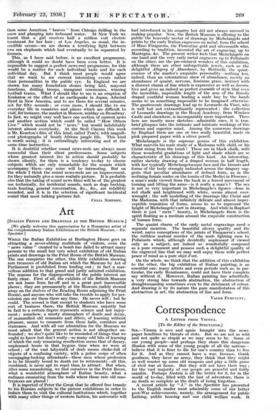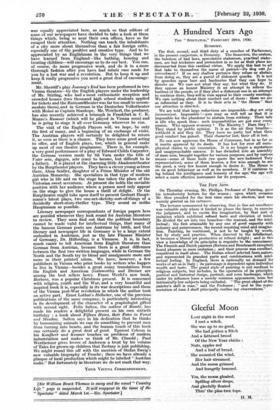Correspondence
A LETTER FROM VIENNA. [To the Editor of the SPECTATOR.]
Sm,—Vienna is now and again brought into the news- ' paper headlines by threats of riots. But we are not as wild and not quite as stupid as we may seem to be. Some of our young people—and perhaps they share this dangerous illusion with some of the young people of all the nations— believe that it is finer to die for one's country than to live for it. And as they cannot have a war, because, thank goodness, they have no army, they think that they might as well muster up some old weapons and play a little game of- civil war at home. But they will not have their way ; for the vast majority of our people are peaceful and fairly sensible. Perhaps Austria is all the better for it, for in the world of to-day, filled with the lust of adventure, there is no death so complete as the death of being forgotten... A recent article by "J." in the Spectator has presented to the English reader most admirably some 'of our better post-War achievements, namely, the arrangement for public bathing, public housing and our child welfare work. It
was equally appreciated here, so much so that editors of some of our newspapers have decided to take a look at thes things which, being so near their own offiCes, have so far escaped their attention. Nothing can teach the inhabitants of a city more about themselves than a fair foreign critic, especially one of the positive and creative type. And to be appreciated by an Englishman in the very things that we have learned from England—like bathing, housing and treating childien—will encourage us to do our best. You can, of course; do more progressive work, and do it in a more thorough fashion after you have had tabula rasa made for you by a lost war and a revolution. But to keep it up and keep it really progressive you need a great deal of encourage- ment.
Mr. Sherrill' s play Journey's End has been performed in two Vienna theatres—by the English players under the leadership of Mr. Stirling, who had a most enthusiastic reception and crowded houses (two thousand high school students applied for tickets and the Raimundtheater was far too small to accom- modate them), and in German in the Deutsches Volkstheater with Moissi as Captain Stanhope. Mr. Weichert, the producer, has also recently achieved a triumph in Frankfurt in C. K. Munro's Rumour (which will be played in Vienna soon) and he is going to stage it all over Germany wherever he can.
The visit of the English Players will, we hope, be only the first of many, and a beginning of an exchange of visits. The Austrian players will certainly be delighted to return it, as soon as there is a chance. They have some good acting to offer, and of English plays, too, which in general make up most of our theatre programme. There is, for example, a very good performance of a play of Edward Childs Carpenter, the German version made by Sil Vara under the title of Vater sein, dagegen, sehr (easy to become, but difficult to be a father). It is played at the charming little Akademietheater by the Burgtheater players. They have a clever young actress there, Alma Seidler, daughter of a Prime Minister of the old Austrian Monarchy. She specializes in that type of modern girl who in life and on the stage has taken the place of the Victorian sweet seventeen. At present she holds the enviable position with her audience where a person need only appear on the stage to give the house a thrill of delight. Or the Burgtheatre might take upon itself to present Gerhart Haupt. mann's latest plays, two one-act-sketchy-sort-of-things of a decidedly short-story-thriller type. They sound as unlike Hauptmann as possible.
Literary newspaper correspondents of foreign papers here are puzzled whenever they look round for Austrian literature to review.. They soon find out that the political boundary cannot be made valid for intellectual things, that many of the famous German poets are Austrians by birth, and that literary and newspaper life in Germany is to a large extent embodied in Austrians, just as the late Finanee Minister of Germany, Dr. Hilferding, is a Viennese. It is, in fact, much easier to tell American from English literature than German .from Austrian, because there is a great difference between the first two written languages, while in German the North and the South try to blend and amalgamate more and more in their printed idiom. We have however, a few publishers in Vienna who print books by writers who happen to live in Vienna—besides a great many translations from the .English and American (Galsworthy and Dreiser are among the best sellers here). Franz Werfel's new book, Barbara, was a popular Christmas present. It is concerned with religion, youth and the War, and a very beautiful and inspired book it is, especially in its war descriptions and those of the Vienna post-War revolution in which the author took an active part. Ernst Lothar's Hellseher, one of the previous publications of the same company, is particularly interesting in its development of the character of a graphologist gifted with second sight. Felix Salten, the author of Bambi, has made his readers a delightful present on his own sixtieth birthday : a book about Fifteen Hares, their Fates in Forest and Meadow. Salten says in his dedication that he thinks by humanizing animals we can do something to prevent men from turning into beasts, and the human touch of this book can certainly do a great deal of gciod. Egmont Colerus in his- Kaufherr and Kramer touches 'on problems Of modern industrialism and makes us think of Mr. Clissold ; Paul Wertheimer gives lovers of Andersen a treat by his volume of Tales for grown-up children that Zsolnay is just publishing. -We might round this off with the mention of Stefan Zweig's new valuable biography of Fouehe; there we have already a glimpse of local production which might be labelled " Austrian make." But fortunately in literature we do not mark that way.
YOUR VIENNA CORRESPONDENT.











































 Previous page
Previous page